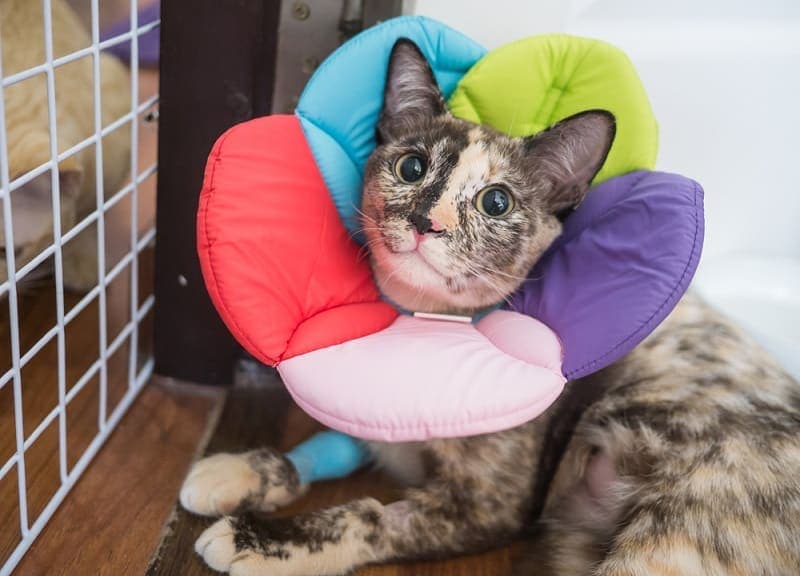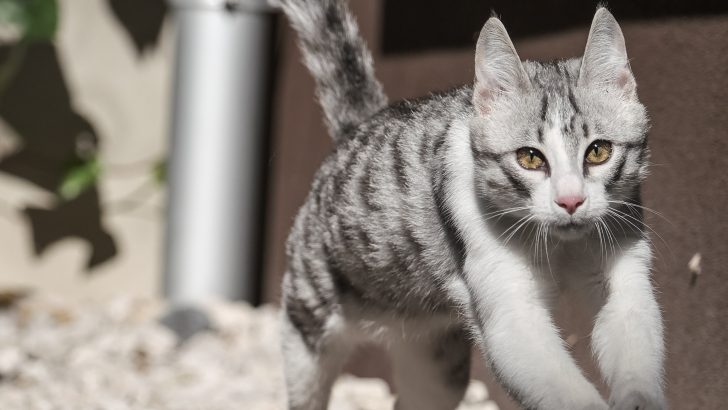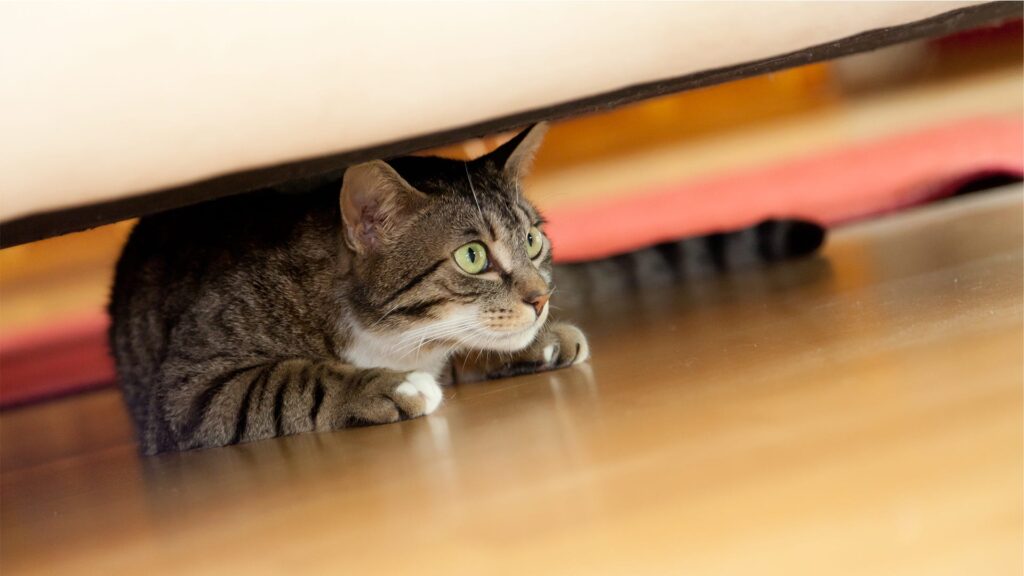To stop a cat from licking a wound, try these 5 helpful methods. First, use an Elizabethan collar to prevent access to the wound.
Second, keep the wound clean and dry. Third, distract the cat with interactive toys or puzzle feeders. Fourth, apply a bitter-tasting deterrent to the wound. Fifth, consult a veterinarian for additional guidance. While it may be challenging to prevent a curious cat from licking a wound, these strategies can effectively discourage the behavior and promote healing.
Contents
- 1 Understanding Cat Wound Licking Behavior
- 2 Identifying The Root Cause Of The Licking Behavior
- 3 Strategies To Prevent Wound Licking
- 4 Natural Remedies To Discourage Licking
- 5 Seeking Veterinary Assistance
- 6 Frequently Asked Questions Of How To Stop A Cat From Licking A Wound: 5 Things That Help
- 7 Conclusion
Understanding Cat Wound Licking Behavior
Cats have a natural instinct to groom themselves, and when they have a wound, they may try to lick or bite it. Why do cats lick their wounds? The behavior serves several purposes. Firstly, licking helps clean the wound by removing dirt and debris. Secondly, the saliva contains enzymes that promote the healing process. However, excessive licking can be a problem. It can lead to risks such as infection, delayed healing, and potential damage to the wound. Therefore, it’s important to address the behavior properly.
The risks associated with excessive licking primarily include introducing harmful bacteria to the wound, irritation caused by the cat’s rough tongue, and prolonged wound exposure hindering the healing process. Moreover, excessive licking can worsen the wound, leading to complications and increased veterinary intervention.
The importance of addressing wound licking cannot be stressed enough. Preventing or managing this behavior is essential to ensure proper wound healing. Several interventions can help discourage the behavior, such as using a cone collar, applying deterrent sprays, keeping the wound clean, distracting the cat with toys, providing a calm environment, and seeking veterinary advice if needed.
Identifying The Root Cause Of The Licking Behavior
Identifying the root cause of a cat’s licking behavior is essential when trying to stop it from licking a wound. One possible trigger for excessive licking is stress and anxiety. Cats may lick their wounds as a self-soothing mechanism in response to these emotions. Reducing stress levels by providing a calm environment, offering interactive toys, or implementing behavior modification techniques can help alleviate this behavior.
Allergies and skin irritations can also contribute to a cat’s desire to lick wounds. Identifying and addressing the underlying cause of the allergies or irritations, such as flea infestations, dermatitis, or food allergies, is crucial in stopping the excessive licking. Consulting with a veterinarian can help determine the appropriate treatment for these issues.
Furthermore, underlying medical conditions like hyperthyroidism or arthritis may lead to increased licking. Treating and managing these conditions can help mitigate the licking behavior. Regular veterinary check-ups and diagnostic tests can help identify any medical issues that may be contributing to the behavior.
By understanding the root cause of a cat’s licking behavior and addressing it accordingly, pet owners can effectively stop their cats from licking wounds and promote healing.
Strategies To Prevent Wound Licking
When a cat has a wound, it’s important to prevent them from licking it to avoid further complications. One effective strategy is to use Elizabethan collars or “cones of shame.” These collars are designed to prevent cats from reaching their wound and are commonly used after surgeries or to treat skin conditions. By restricting access to the wound, the collar helps it heal faster. Another approach is to distract the cat with toys or treats. Provide engaging toys that can keep their attention away from the wound. Additionally, treats can be used to reward positive behavior and redirect their focus. Creating a comfortable and stress-free environment also plays a crucial role. Ensure that the cat has a peaceful space, away from loud noises or disturbances. Provide soft bedding and a clean litter box to promote relaxation. By implementing these strategies, you can effectively prevent your cat from licking their wound and facilitate proper healing.
Natural Remedies To Discourage Licking
When trying to stop a cat from licking a wound, there are several natural remedies that can be effective. Bitter-tasting sprays can be used as a deterrent, as the unpleasant taste will discourage the cat from licking the wound. Herbal remedies such as chamomile or lavender can be beneficial for calming the cat and promoting healing. These herbs can be applied topically or used as a spray. Additionally, natural wound care solutions such as aloe vera gel or honey can help to soothe the wound and speed up the healing process. It is important to clean the wound gently before applying any remedies. By utilizing these natural remedies, you can effectively discourage a cat from licking their wound and promote the healing process.
Seeking Veterinary Assistance
It is important to know when to consult a veterinarian for your cat’s wound. Professional advice is essential for managing wound care and ensuring the best treatment options for excessive licking.
When it comes to seeking veterinary assistance, it is recommended to consult a veterinarian if:
- Your cat’s wound is deep or bleeding excessively.
- There are signs of infection, such as swelling, redness, or pus.
- The wound is not healing or is becoming worse.
Additionally, if your cat seems to be in pain or discomfort, it is essential to seek veterinary help. A veterinarian can provide the necessary expertise and guidance to address your cat’s licking behavior and ensure proper wound care.

Credit: www.hepper.com
Frequently Asked Questions Of How To Stop A Cat From Licking A Wound: 5 Things That Help
What Can I Put On My Cat To Stop Licking Wound?
To prevent your cat from licking a wound, you can use an Elizabethan collar, also known as a cone collar. It acts as a protective barrier, preventing access to the affected area.
Can I Put Something On My Cat To Stop Licking?
Yes, you can use products like bitter sprays or specialized collars to deter your cat from excessive licking.
How Do I Get My Cat To Stop Licking After Surgery?
To help your cat stop licking after surgery, try using an Elizabethan collar or a soft e-collar to prevent access to the surgical site. Distraction techniques, like interactive toys or treats, can also redirect your cat’s attention. Consult with your veterinarian for additional recommendations specific to your cat’s needs.
How Do You Cover A Cat Wound?
To cover a cat wound, start by cleaning the wound gently with mild antiseptic solution. Then, apply an antibiotic ointment and cover the wound with a sterile non-stick bandage. Regularly change the bandage and monitor the wound for any signs of infection.
Conclusion
Taking proactive steps can help prevent cats from excessively licking wounds. Creating a distraction with toys or treats, using topical treatments, covering the wound with a cone or bandage, promoting healing with natural remedies, and seeking veterinary guidance are all effective strategies.
By following these tips, you can ensure your cat’s wound heals properly and avoid any potential complications. Keep your feline friend comfortable and well-cared for, helping them recover quickly and safely.
Katie Lindsey is a passionate cat lover and founder of Cats Solution, a comprehensive resource for all things feline. With a lifelong love for cats and extensive knowledge in their care and behavior, she provides expert advice and solutions to cat owners. Through her website, Katie fosters a supportive community where cat enthusiasts can find guidance and heartwarming stories. A dedicated advocate for animal welfare, Katie also promotes responsible pet ownership and adoption. Join her on this purr-fect journey celebrating the joy of feline companionship.



